Diogenes
Diogenes, which was founded in Zurich in 1952, is one of the largest independent "Belletristikverlage" in Europe and also one of the largest publishers of literature from Flanders an the Netherlands in the German language area.
"Diogenes Verlag aims to entertain with readable literature, to baffle with the new, but also to rediscover the old; to overlook the 'new for the sake of the new' and thus distinguish the fashionable from the modern. There can't be that much that is truly new. Real avant-garde, says Karl Kraus, is nothing other than the courageous regression to reason - and the new, which only looks like the old, takes some getting used to." (Daniel Keel, Founder of Diogenes) (Daniela Völker, 2014, p. 296)
Willem Frederik Hermans
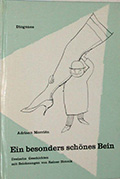

It took some time before Diogenes found its way to Dutch literature. Already in the fifties Diogenes published a work by Adriaan Morrien (Ein besonderes schönes Bein und andere Mitteilungen aus der Anatomie des Alltags [An Especially Beautiful Leg and Other Messages From the Anatomy of Everyday Life] (1957) and with that immediately set a special accent in the history of Dutch literature in German translation in Switzerland. But after that Dutch literature disappeared from Diogenes' publications again for many years.
Only in the mid-eighties they revisited the idea, this time publishing a work by one of the three big names in Dutch literature: Willem Frederik Hermans. Hermans' oeuvre found its way into the German language comparatively late. His bestseller, De donkere kamer van Damokles [The Darkroom of Damocles], was translated into Danish as early as 1961, and shortly afterwards translations appeared in Norwegian, French, Swedish, English and Finnish. The first German translation of The Dark Room however was published by Kiepenheuer as recently as 2002.
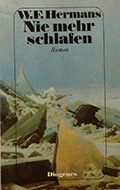
It is safe to assume that the translator Georg Hermanowski (Link), who determined the perception of Dutch literature in the German-speaking world in the 1960s, played a significant role in this. In any case, it doesn't seem to be a coincidence that the first time an independent translation of a book by Willem Frederik Hermans was published in the German-speaking world it was a translation by Hermanowski's successor Jürgen Hillner (Die Tränen der Akzien [The Tears of the Acacias], Melzer, 1968). In 1986, Diogenes published a paperback edition of Rosemarie Still's translation of Nooit meer slapen [Never sleep again] which had originally been published two years earlier by Rainer Wunderlich in Tübingen. A year later Diogenes published Herman's key novel about the narrow-mindedness of academia under the title Unter professoren [Among Professors].
"When I was twenty, I tried to write and paint myself. I had to realise that my talent was not enough. I became an intermediary for those who could do better, so I became a midwife, butler and banker all in one." (Daniel Keel)
Connie Palmen
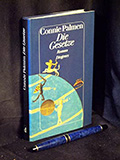
At the end of the 1980s, Diogenes tried for a while with thrillers by Van Gulik, but then Diogenes made a golden move with Connie Palmen. In one the golden touch. In line with the participation of Flanders an the Niederlands at the Frankfurt Book Fair as Guests of Honour in 1993, Diogenes published the first German translation of a work by Connie Palmen. Her "imaginative" (Fluemann, 1993) debut novel De Wetten was well received. In it a young woman searches for her identity and the laws that determine life. A paperback edition was published by Diogenes in 1995 and later the translation by Barbara Heller was also distributed to the citizens of Vienna in an edition of 100,000 copies as part of the annual "Free Book Capaign" Eine Stadt. Ein Buch [One City. One Book], in which a book by a famous author is given to interested readers for free.
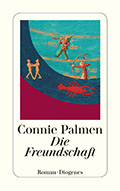
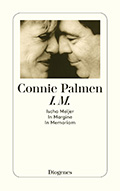
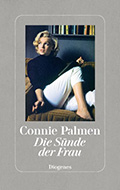
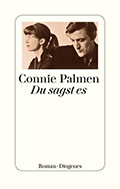
"Diogenes publishes not only books, but above all authors and their complete works. (Diogenes, n. d.)
Leon de Winter
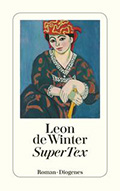
Daniel Keel and Leon de Winter met at the Frankfurter Buchmesse in 1993. At that time there was a lot of interest in Dutch literature. The Netherlands and Flanders were Schwerpunkt in 1993. (Link).
Leon de Winter was also represented at the book fair, with his novel SuperTex, which had just been published by Piper. Leon de Winter, whose first novel Die (Ver)Bildung des jüngeren Dürer was published by Aufbau in Berlin, was not very happy with his new publisher. SuperTex did not get the expected attention. The mood was below zero.
"I had already had a few days of book fair frustration. Hardly anyone was interested in me. Every time I passed the Beate Uhse shop window, I considered hanging up my writing career. In the heat of the late, noisy meetings in the bar of the Frankfurter Hof, where a glass of wine cost as much as a twenty-thousand-kilometre inspection on a Porsche, I felt lost. There was a Porsche in my book. Serious authors don't write about Porsches. At the Munich publishing house they were ashamed of me." (De Winter, 2011, p. 16)
And then Daniel Keel came and asked if he could reissue SuperTex. De Winter seized his chance and Daniel Keel bought the entire print run of Piper (no more than 8 copies were sold). (De Winter, 2011)This was the beginning of Leon de Winter's successful career with Diogenes. In 1994, both the reissue of SuperTex and de Winter's new novel Hoffman's Hunger were published in Zurich. Diogenes is now the house publisher of the De Winter family. The translations of works by the wife of Leon de Winter, Jessica Durlacher and of his daughter Solomomica are also published by Diogenes.
"any kind of writing is allowed, just not the boring kind". (Diogenes, n.d.)
Arnon Grunberg
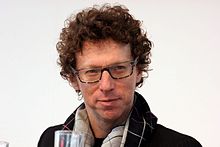
In 1997, a third successful author from the Dutch language area started at the "congenial" (Bartels, 2004) publisher Diogenes. Blauer Montag [Blue Mondays], the translation of Arnon Grunberg's debut novel in the Netherlands, was also very successful in the German language area. Although some critics couldn't understand the "disproportionate enthusiasm" (Bischoff, 1997) with which Grunberg's provocative tragi-comic life story of a 'happy' idler was received in the Netherlands, and were disturbed by "endless repetitions" (Flühmann, 1993) and the "boring verbiage" (Dieckmann, 1997) in the novel by the "wannabe Bukowski" (Dieckmann, 1997), other critics reacted very favourably to Grunberg's debut in the German language area. Grunberg's style is appreciated by many. They praise Grunberg's work as being both "brutally laconic" (Eggebrecht, 1997), "light and flocculent" (Träume, 2007) and distinctly "self-ironic" (Eichmann-Leutenegger, 1997). Ultimately more than 170,000 copies of the book were sold.
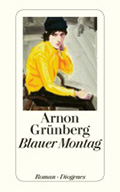
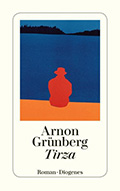
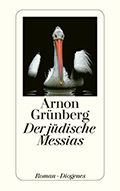
Grunbergs Alter Ego
In 1999, Marek van der Jagt's De geschiedenis van mijn kaalheid [The Story of My Baldness] was published in the Netherlands. The book immediately received a prize. But little was known about the author. According to the publisher, Marek van der Jagt was the Vienna born son of a Dutch father and a German-speaking mother in Vienna who, after studying philosophy at the University of Vienna, devoted himself entirely to writing. But doubts soon arose. Marek van der Jagt's work was too similar to Grunberg's. In 2002, Arnon Grunberg revealed that he was Marek van der Jagt in Vienna. Amour Fou was Arnon Grunbergs first German translation that was published under the name of Marek van der Jagt's and appeared with Diogenes in 2002.
"The combination of erotic tension and the most banal everyday incidents is what makes the novel so appealing, and it never slips into the embarrassing. (Brockschmidt, 2002)“
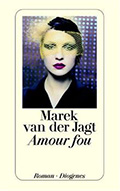
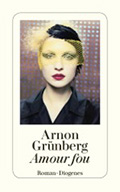
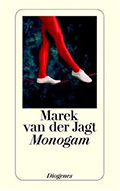

Although it became clear that Marek van der Jagt was Arnon Grunberg in 2002 his work was only published by Diogenes under his real name after 2005. Albeit not exactly because Arnon Grünberg is actually just Grunberg, without the dot on the 'u'. In fact, we could say that all of Grunberg's books in the German language area were published under a pseudonym. "Becoming what we play" appears not only to only have been the motto of François Lepeltier, the protagonist of Van der Jagt's second novel GSTAAD 95-98.
After 2005, a new title by Grunberg appeared with Diogenes almost every year. Most books were published in two editions: first as a hardcover and then as a paperback. Only the books by Marek van der Jagt were published in more editions: two under the name Van der Jagt and one under the name Arnon Grünberg.
Moved

Since 2014, Grunberg's books have been published in the German language area by Kiepenheuer & Witch. This publisher's titles by Grunberg include: Der Mann, der nie krank war [The Man Without Illness] (2016), the "touching[], mercilessly funny[] novel about forms of love and the eternal bond between mother and son" (Sojitrawall, 2016), Muttermale [Birthmarks] (2016) and Besetzte Gebiete [Occupied Territories] (2021), Grunberg's "attempt [...] to explore the Middle East conflict from a secular and religious perspective" (Rebhandl, 2021). These books were translated by Rainer Kersten, who apparently followed Grunberg from Zurich to Cologne.
The Gardens of Delight and the Hidden
"Diogenes Verlag aims to entertain with readable literature, to baffle with the new, but also to rediscover the old; to overlook the 'new for the sake of the new' and thus distinguish the fashionable from the modern" (Daniel Keel) (Diogenes)
The titles of Diogenes are very varied. Diogenes not only publishes the work of international best-selling authors. Diogenes' titles also include a large collection of classics, thrillers, cartoons, children's books, art books and narrative non-fiction. Hanni Ehlers (translator of Peter Zantingh's first work Nach Mattias [After Mattias], 2020) has translated several romanticised biographies of artists such as Hieronymus Bosch, Leonardo da Vinci and Pieter Breughel for Diogenes.
"I thought I was being guided by the effect of his work on my imagination. But as it so often happens with characters in novels, Jerome began to take on a life of his own under my hands. It was as if he wanted to force me to finally tell things his way" (John Vermeulen, 2002)


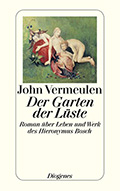
(Herbert Van Uffelen)
References
Bartels, Gerrit: Belgien als Sehnsuchtsort - Die Niederlande und Flandern sind zwei Länder, die durch eine gemeinsame Sprache getrennt sind. (..). In: die tageszeitung, Vol.: 7355 [11.05.2004], (2004) - p. 17
Bischoff, Matthias: Und ewig lockt der Tischfußball - Arnon Grünberg feiert einen blauen Montag nach dem anderen.In: Frankfurter Allgemeine Zeitung, Vol.: 14-04-1997, (1997)
Brockschmidt, Rolf: Doppeltes Spiel - Wer ist der Autor? Der Debütroman „Amour Fou' provoziert einen niederländischen Literaturkrimi. In:In: Der Tagesspiegel, Vol.: 03-06-2002 - Berlin, (2002)
De Winter, Leon: Ciao, großer Mann. In: Daniel Keel 1930-2011. Diogenes, Zürich, 2011.
Dieckmann, Dorothea: Möchtegern-Bukowski - Arnon Grünbergs 'Blauer Montag'. In: Neue Zürcher Zeitung, Vol.: 20-03-1997, (1997)
Diogenes: Über uns. https://www.diogenes.ch/leser/verlag/ueber-uns.html
Eggebrecht, Harald: Beinhart um die nächste Ecke - Arnon Grünbergs glänzender Debütroman 'Blauer Montag'. In:In: Süddeutsche Zeitung, Vol.: 25-04-1997, (1997)
Eichmann-Leutenegger, Beatrice: Ein Amsterdamer Taugenichts - Arnon Grünbergs Roman 'Blauer Montag'.In: Der Bund, Vol.: 07-06-1997, (1997)
Fluehmann, Susanna: Das 'Reich der Männer' und die 'Natur der Frau' - Selbstbewusster Erstling: Connie Palmens Roman 'Die Gesetze'. In:Tages-Anzeiger, Issue: 21. Dez., (1993)
Rebhandl, Manfred: Arnon Grünberg - Männer und Frauen als besetzte Gebiete.In: Der Standard, Issue: 29. Mai, (2021)
Sojitrawalla, Shirin: Mütter und andere Notfälle.In: TAZ -Archiv - Taz am Wochenende, Issue: 15. Okt., (2016)
Vermeulen, John: Das Mysterium Hieronymus Bosch. In: Der Garten der Lüste - Roman über Leben und Werk des Hieronymus BoschTrans.: Ehlers, Hanni - 1. ed. - Zürich : Diogenes, (2002)
Völker, Daniela: Das Buch für die Massen, Tectum Wissenschaftsverlag, Marburg, 2014.
